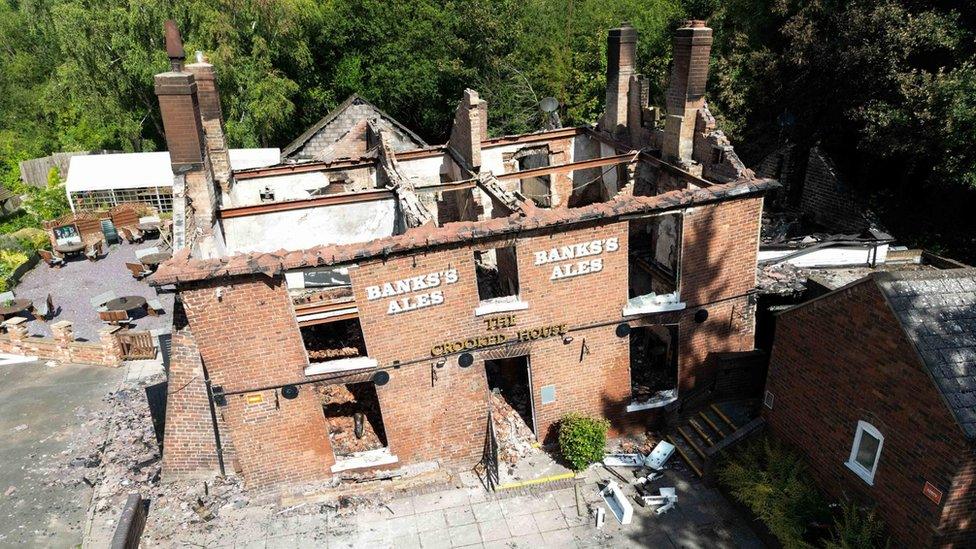Two pubs a day disappearing in England and Wales
- Published

The destruction of the Crooked House pub in the West Midlands provoked outrage
Two pubs a day have disappeared in England and Wales in the first half of the year, according to government statistics.
Figures showed that 230 pubs vanished in the three months to 30 June - an increase over the previous quarter when the doors to 153 pubs shuttered.
It means 383 pubs were demolished or converted for other uses between January and June.
Campaigners have called for planning laws to change to protect pubs.
It comes after The Crooked House pub in the West Midlands - once dubbed the UK's "wonkiest" public house - was gutted in a fire and then demolished without full permission in August, provoking outrage in the community and beyond.
The overall number of pubs in England and Wales, including those vacant and being offered to let, fell to 39,404 at the end of June, according to the data, which was compiled by commercial real estate specialists Altus Group.
Wales lost the greatest number of pubs in the first half of the year, with 52 disappearing, while London and the North West lost 46 each.
A total of 386 pubs disappeared throughout the whole of 2022.
Chris Miles owns the Fleece in Richmond, North Yorkshire, and a few months ago decided to sell up: "I just thought 'I can't solve this problem'," he told BBC News.
The 13-bedroom hotel, pub and restaurant business was popular with locals and tourists in the Dales market town.
"It's a three-way squeeze," he said - citing staffing, running costs and taxation as the causes.
"VAT is the single biggest problem, a fifth of the money we generate we have to pay to HMRC. My last bill was £26,000 - and that's for a business that's never made a profit," Mr Miles explained.
"We don't want hand-outs or grants, we just want to keep more of the money we generate."
Alex Probyn, president of property tax at Altus Group, called on Chancellor Jeremy Hunt to take action in his autumn statement in November, including by easing the pressure of business rates on the sector.
Currently, firms that pay business rates - which is charged on most non-domestic properties, including pubs, offices and holiday homes - will see an inflation-linked increase come next April unless there is government intervention.
This is expected to add more than 6% to bills next year.
"With energy costs up 80% year-on-year in a low-growth, high-inflation and high-interest rates environment, the last thing pubs need is an average business rates hike of £12,385 next year," Mr Probyn said.
Pubs, as with other eligible hospitality, leisure and retail businesses, currently get a 75% discount off their business rates bills for the 2023-2024 tax year up to a cap of £110,000 per business, but this is set to end in March 2024.
The Campaign for Pubs has warned that even profitable pubs are being lost due to landlords wanting to "cash in" by developing pubs, such as by converting or demolishing premises for housing.
The group - which aims to promote, protect and support pubs across the country - has called on the government to introduce stricter penalties for "unauthorised conversions and demolitions".

Have you been affected by the issues raised here? Has your local closed down? You can share your experience by emailing haveyoursay@bbc.co.uk, external.
Please include a contact number if you are willing to speak to a BBC journalist. You can also get in touch in the following ways:
WhatsApp: +44 7756 165803
Tweet: @BBC_HaveYourSay, external
Please read our terms & conditions and privacy policy
If you are reading this page and can't see the form you will need to visit the mobile version of the BBC website to submit your question or comment or you can email us at HaveYourSay@bbc.co.uk, external. Please include your name, age and location with any submission.